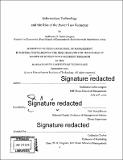Information technology and the rise of the power law economy
Author(s)
Saint-Jacques, Guillaume B
DownloadFull printable version (3.453Mb)
Other Contributors
Sloan School of Management.
Advisor
Erik Brynjolfsson.
Terms of use
Metadata
Show full item recordAbstract
We show that the dramatically increasing share of income going to top earners can be explained by the rise of the "power law economy" and argue this reflects increased digitization and networks. Specifically, tax data (1960-2008) show that a bigger share of individual incomes are drawn from a power law, as opposed to the long-established log-normal distribution. We present a simple theoretical model to argue that the increased role of power laws is consistent with the growth of information technology, because digitization and networks facilitate winner-take-most markets. We generate four testable hypotheses, and find they match the data. (1) Our model, incorporating power laws, fits the data better than any purely log-normal distribution, (2) the increase in the variance of the log-normal portion of the distribution has slowed, suggesting a slowing of skill-biased technical change, (3) more individuals now select into the power law economy, (4) there is more skewness within that economy.
Description
Thesis: S.M. in Management Research, Massachusetts Institute of Technology, Sloan School of Management, 2015. Cataloged from PDF version of thesis. Includes bibliographical references (pages 36-38).
Date issued
2015Department
Sloan School of ManagementPublisher
Massachusetts Institute of Technology
Keywords
Sloan School of Management.